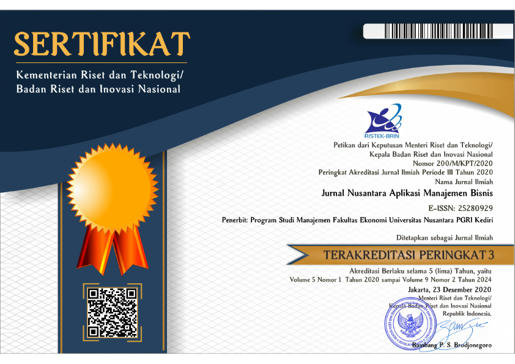Innovation-based Human Resources Performance Improvement Strategy to Support Tourism Recovery at Tourism Village
DOI:
https://doi.org/10.29407/nusamba.v8i2.18901Keywords:
Human Resources Strategy, Tourism Villages, SWOTAbstract
Research aim: This study aims to analyze the internal and external factors of human resource performance in order to formulate a strategy to improve human resource performance based on innovation in tourism villages in the Magelang area
Design/Methode/Approach: This research uses a descriptive qualitative approach. Primary data were obtained based on interview data collection methods and participatory observation. SWOT analysis was used as the data analysis method.
Research Finding: The results showed strategy formulations to improve human resource performance. The proposed strategies become an effort to restore tourism activities in the new normal era after Pandemi Covid-19.
Theoretical contribution/Originality: This study identified the internal and external conditions of human resources based on innovation factors.
Practitioner/Policy Implication: The results give implications to the manager in order to improve human resource performance including increasing the intensity of human resource training and development programs, increasing the competence of human resources to innovate and create an integrated tour package according to the needs of tourists, providing adequate health facilities for human resources, increasing cooperation with other tourism actors, and make a long term of human resource development planning based on innovation.
Research limitation: This research conducted limited on the tourism villages in the Magelang area as a tourism object. Further research can develop other tourism areas with different characteristic to expand research benefits.
Downloads
References
Dharmawan, I. M. A., Sarjana, I. M., & Yudhari, I. D. A. S. (2014). Strategi Pengembangan Desa Wisata Di Desa Belimbing Kecamatan Pupuan Kabupaten Tabanan. Jurnal Agribisnis Dan Agrowisata, 3(1), 1–11.
Harsanti, K. P., Dewi, K. I., & Ni, W. S. (2017). Strategi Bersaing Degan Online Travel Agent (OTA) Menggunakan Pendekatan SWOT Analysis Pada PT Mitra Global Holiday Bali Unit Usaha MG Bedbank. Jurnal Bisnis Dan Kewirausahaan, 13(3), 166–175.
Nasehi, S., & Allahyari, H. (2017). Assessment of rural tourism using SWOT analysis ( Case Study : Masouleh village , Gilan , Iran ). International Journal of Engineering Research And Advanced Technology (IJERAT), 3(5), 8–21.
Novitaningtyas, I., Achsa, A., & Rahardjo, B. (2020). Strategi Pemasaran Desa Brajan Menuju Desa Wisata Mandiri. Jurnal Aplikasi Bisnis Dan Manajemen, 6(3), 591–601. https://doi.org/10.17358/jabm.6.3.591
Novitaningtyas, I., Giovanni, A., & Lionora, C. A. (2022). Faktor-Faktor yang Mempengaruhi Minat Berkunjung Wisatawan di Kawasan Balkondes Borobudur. Jurnal Pariwisata, 9(1), 28–36.
Pramanik, P. D., & Widyastuti, N. (2017). Rural Tourism Destination Strategy through SWOT Analysis in Cibuntu Village - Indonesia. ASEAN Tourism Research Association Conferen (ATRC), 1–9.
Ramadhan, T., Astono, A. D., & Parmenas, N. H. (2021). Strategi Pengembangan Wilayah Agritourism di Pegunungan Menoreh Berbasis Pemberdayaan Komunitas. Jurnal Manajemen Strategi Dan Aplikasi Bisnis, 4(1), 103–116.
Razavi, S. H., & Attarnezhad, O. (2013). Management of Organizational Innovation. International Journal of Business and Social Science, 4(1), 226–232.
Widyaningsih, H. (2016). Analisis Swot Dan Promosi Kerajinan Bambu Desa Wisata Brajan Kabupaten Sleman Yogyakarta. Khasanah Ilmu - Jurnal Pariwisata Dan Budaya, 3(2), 1–10.
Zhang, X. (2012). Research on the Development Strategies of Rural Tourism in Suzhou Based on SWOT Analysis. Energy Procedia, 16, 1295–1299. https://doi.org/10.1016/j.egypro.2012.01.207
Downloads
Published
Issue
Section
License
Authors who publish with this journal agree to the following terms:
- Copyright on any article is retained by the author(s).
- The author grants the journal, the right of first publication with the work simultaneously licensed under a Creative Commons Attribution License that allows others to share the work with an acknowledgment of the work’s authorship and initial publication in this journal.
- Authors are able to enter into separate, additional contractual arrangements for the non-exclusive distribution of the journal’s published version of the work (e.g., post it to an institutional repository or publish it in a book), with an acknowledgment of its initial publication in this journal.
- Authors are permitted and encouraged to post their work online (e.g., in institutional repositories or on their website) prior to and during the submission process, as it can lead to productive exchanges, as well as earlier and greater citation of published work.
- The article and any associated published material is distributed under the Creative Commons Attribution-ShareAlike 4.0 International License












